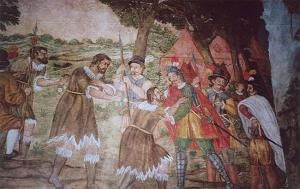Today we welcome the Reverend Doctor Malcolm Foley with his inaugural contribution as a regular contributor to the Anxious Bench.
When I teach and speak in academic and ecclesial contexts about the history of race in America, the first question I always get is, “But what do I do?” The question itself is legitimate; we have witnessed the recent proliferation of books about racism and how to resist it. My friend Christina Edmondson’s recent book, Faithful Anti-Racism: Moving Past Talk to Systemic Change, places the concern of this question in its very subtitle: we talk a lot, but what do we do? The question, “But what do I do?”, even echoes the title of Martin Luther King Jr.’s last and perhaps most significant book, Where Do We Go From Here? But I still initially resist the question when I am asked it. I am not convinced that the person asking has yet fully imbibed or come to terms with the social rot that racialization has wrought in our society. That is, to ask of another person what is to be done to advance racial justice is to misunderstand the nature of the evil and the nature of its solution. In my short inaugural piece for the Anxious Bench, I hope to point us forward by pointing us backward. After all, there is no conversation about the construction that we have called race without a conversation about its history.
In 1948, Trinidadian-American sociologist, Oliver Cromwell Cox, published his magisterial work, Caste, Class and Race, in which he differentiated three distinct forms of social organization: organization by caste, organization by class and organization by race. The entire book is worthy of extended study, but what perhaps bears the most fruit for American Christians is his account of race: both its function and its origin. He sums up his account rather briefly in his introduction:
Racial antagonism is part and parcel of this class struggle [i.e. the question of who shall rule the social system, the few or the many], because it developed within the capitalist system as one of its fundamental traits. It may be demonstrated that racial antagonism, as we know it today, never existed in the world before about 1492; moreover, racial feeling developed concomitantly with the development of our modern social system.
Cox was clear about the interrelatedness of race, power, and money. For him, “racial antagonism is essentially political-class conflict”: that is, if an exploiter wants to continue to exploit, they will use whatever is at hand to maintain said exploitation. This framework explains the origin and perpetuation of the transatlantic slave trade and the justifications that would follow from ecclesial and non-ecclesial voices: the profit-making motive ruled all. As Jonathan Tran summarizes, “[The] horror of racial capitalism does not lie in the notion that some identified others as less than human and so enslaved them…Rather, the horror comes in the fact that slavers knew full well that slaves were human and yet enslaved them.” Racial justification historically follows economic exploitation, not vice versa.
Cedric Robinson would repeat and expand this framing in his 1983 work, Black Marxism: The Making of the Black Radical Tradition. Its central thrust is this: race as a construction is not a mere ideology of difference; it is a construction crafted to justify particular systems of exploitation and domination. Said another way, racism is not a matter of people being mean to other people because of their skin color. The general term, “racism,” is less helpful than the more specific term, “racial capitalism” as coined by Robinson. Robinson argued convincingly that racialization began before the 15th century. Rather, the Slavs in Europe were racialized in the Middle Ages. Why? In order to justify their enslavement and economic exploitation. The reader will notice a trend: where racialization is present, economic exploitation is not far behind.

Why go through all of this particular history with this particular lens? This suggests to me that conversation and action in the pursuit of racial justice, whether in ecclesial contexts or in broader society, will be shallow and ineffective without a robust engagement with racial capitalism: that is, the never-ending cycle of economic exploitation, violent enforcement of that exploitation (which I will flesh out in a future post), and racialized justification of that violence and exploitation. Much of our discourse surrounding race and racism culminates in the language of hate. Thus, its remedies utilize the language of love. This is more myopic than it is wrong; to focus a commitment to racial justice on emotional and ideological change obscures the fact that what we are talking about is material oppression. Hate is the little enemy; death is the big one. Love is indeed the answer, but love must be articulated as a robust response to political and economic oppression if it is to be relevant to racial justice.
The primary historical point that must drive coalitional work for racial justice is this: racism’s foundation is neither hate nor ignorance. Its foundation is the desire to dominate and exploit. Even when we do see racial antipathy manifested in hate, it is often a symptom of deeper political and economic anxieties. Because this is the case, communities ought to consider racism not in terms of thought nor in terms of discrete, hateful actions, but in terms of political economy. For the Christian, that means that recourse to the Apostle’s language about Christ breaking down walls of separation by His incarnation and resurrection is good but incomplete; it must also be coupled with the Old Testament calls to Jubilee and debt forgiveness. It is not enough for me to say that I love my neighbor; I must actually invest in their material well-being.
All of this brings us back to the initial question: what do I do? Where do I go from here? We must understand that being “antiracist” is as much a checklist as being “loving” is, which is to say it isn’t. It is only through substantive relationships with the poor, the oppressed, the racially marginalized and all those whom the world has deemed “less than” that you will find the lifegiving practices that you seek. In future posts, I will draw attention to figures who have done this well, historically, as well as those who failed miserably, but in the midst of that milieu, we must remember this: antiracism is not a matter of just being nice to one another. It is a matter of building a political economy that rests neither on self-interest nor exploitation nor domination, but rather one that robustly takes comprehensive human flourishing as its first priority.














